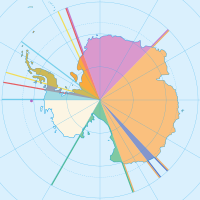Terra nullius
international law term meaning territory which has never been the subject of a sovereign nation
(Redirected from Unclaimed territory)
Terra nullius means unclaimed territory. It is the correct term in international law. It means land which does not (at present) belong to any state. The term comes from the Latin, meaning Nobody's thing. There is also an expression no man's land, but that does not have a formal legal meaning.

Under Serbian control, claimed by Croatia
Under de facto Croatian control, although not claimed by either Croatia or Serbia

Rule over terra nullius can be got by occupying the territory.[1] There are various legal problems about this concept, but in practice it is often the business of neighbouring states to decide by negotiation. Diplomacy may sometimes be replaced by warfare.
Two territories that are currently terra nullius are Bir Tawil between Egypt and Sudan, and Marie Byrd Land, in Antarctica.
References
change- ↑ "New Jersey v. New York, 523 US 767 (1998)". US Supreme Court. 26 May 1998. Retrieved 29 January 2010.
Even as to terra nullius, like a volcanic island or territory abandoned by its former sovereign, a claimant by right as against all others has more to do than planting a flag or rearing a monument. Since the 19th century the most generous settled view has been that discovery accompanied by symbolic acts give no more than "an inchoate title, an option, as against other states, to consolidate the first steps by proceeding to effective occupation within a reasonable time.8 I. Brownlie, Principles of Public International Law 146 (4th ed.1990); see also 1 C. Hyde, International Law 329 (rev.2d ed.1945); 1 L. Oppenheim International Law §§222-223, pp. 439-441 (H. Lauterpacht 5th ed.1937); Hall A Treatise on International Law, at 102-103; 1 J. Moore, International Law 258 (1906); R. Phillimore, International Law 273 (2d ed. 1871); E. Vattel, Law of Nations, §208, p. 99 (J. Chitty 6th Am. ed. 1844).